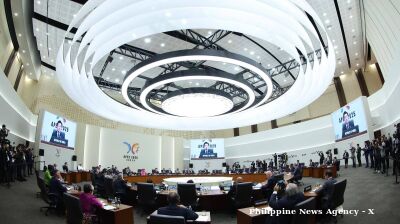The Slovak Information Service (SIS) owns the notorious Israeli Pegasus spyware, claims Juraj Krupa, an MP from the opposition neoliberal SaS party.
“Nobody, really nobody in Slovakia can be certain to have privacy and can communicate in privacy,” Krupa was quoted as saying by state broadcaster STVR.
The opposition also wants to open a parliamentary session at the committee overseeing SIS, but the committee is left without a chairman after Maria Kolikova (SaS) was removed by the ruling left-right coalition of populist Prime Minister Robert Fico, which effectively leaves the committee paralysed.
SIS has denied the claims it possesses Pegasus, describing this as “disinformation”, while the Minister of Environment Tomas Taraba, a nominee of the far-right SNS party, stated that “it is absolute nonsense, no such purchase has been made”.
Minister of Interior Matus Sutaj Estok stated “in a short time we will come up together with the minister of justice [Borus Susko] with a legislative proposal which will absolutely rule out such use of similar eavesdropping systems, bugs respectively, which would know how to destroy privacy”.
Pegasus spyware was acquired by the radical rightwing governments of Hungary and Poland and allegedly used to spy on opponents. A special European Parliament committee found that Hungary had grossly misused its power by exploiting the spyware.
Poland's new centrist government is investigating the possible misuse of the technology. The prosecutor has charged former deputy justice minister Michał Woś with exceeding his powers and failing to fulfil his obligations by transferring PLN25mn from the Justice Fund to purchase the Pegasus software for the Central Anticorruption Bureau.
In Slovakia, critics claim Fico is following Hungarian premier Viktor Orban's authoritarian playbook. Fico’s ruling coalition led by his leftist Smer party holds a narrow majority in the parliament and has pursued an aggressive power grab since taking power last autumn, including sweeping staff changes in police, changes to the criminal code and a makeover of the media landscape in the country.
Last month, Pavol Gaspar, son of prosecuted police ex-president and current Smer legislator and Vice Chairman of the Parliament Tibor Gaspar, was appointed to head the SIS despite criticism of his connections to the criminal ring allegedly involving Tibor Gaspar’s relative, the Nitra-based oligarch Norbert Bodor.
Slovakia’s new president Peter Pellegrini, whose campaign was backed by Fico’s coalition, stated he has “not found any legal reasons to turn down his [Gaspar’s] nomination”. Pellegrini’s predecessor Zuzana Caputova declined to appoint Gaspar to head the SIS, but Fico’s government restructured SIS and gave Pavol Gaspar the deputy director post with effective control of SIS.
Earlier this year, regional outlets, including the VSquare media platform, reported that European intelligence services began to curtail the sharing of information with SIS in response to the staff changes made by Fico’s cabinet.
In a separate development, the ruling coalition initiated a no-confidence motion against the vice chairman of the parliament and the opposition leader Michal Simecka in a culmination of public attacks against Simecka and his family, launched by Fico.
Fico alleges Simecka's family has benefited from state subsidies through a foundation named after his grandfather, Czechoslovak writer, philosopher and communist-era dissident Milan Simecka who died in 1990. Simecka, who is 40, denies receiving any money from the civil society foundation.
“If the Andrej Bagar Theatre in Nitra obtains state support, it does not mean that the family of Andrej Bagar benefits from it,” said in August, giving the example of the 20th century Slovak actor and director and the theatre in the town of Nitra named after Bagar.
One vice chairman (or speaker) post at the parliament is traditionally reserved for a leader of the strongest opposition party, which is Simecka’s centrist Progressive Slovakia. Removing Simecka would mean that all the speakers would be from government parties, potentially further limiting opposition time in the parliament.
Simecka stated publicly that the document filed for his removal from the parliamentary post was penned by SIS chief Pavol Gaspar, saying “how can we trust SIS that it can fulfil its duties when its boss can’t even clear up traces of his involvement?”
Simecka also wrote on his Facebook social media profile that Gaspar's participation in "liquidating opposition" may "sound like Belarus," but "unfortunately it is happening here".
"Are they [Pavol and Tibor Gaspar] sharing their email account where mail for the SIS and parliament arrive? Is the SIS chief sharing a storage location of documents with his father? Is he about to provide his father with a licence for the eavesdropping system Pegasus?" Simecka asked rhetorically.
News

US–China soybean sales restart
According to Scott Bessent, US Treasury Secretary, the agreement marks a significant step towards restoring normalcy for American farmers.

Russia faces $50bn annual losses from oil sanctions as Lukoil exits international assets
Russia is expected to lose at least $50bn annually due to oil-related sanctions, as Moscow’s largest private oil producer Lukoil agrees to sell its international assets and Germany considers nationalising operations owned by state-run Rosneft.

Chicken and chips in Seoul - for Nvidia, Samsung and Hyundai
In a low-key fried chicken shop in southern Seoul, the leaders of Nvidia, Samsung Electronics and Hyundai Motor held an informal meeting on the evening of October 30.

Presidents Lee and Xi begin diplomatic chapter at APEC summit
President Lee, who is chairing the first session of the summit at the Hwabaek International Convention Centre, stood at the entrance to personally welcome participants. President Xi reached the venue at approximately 10:02.




